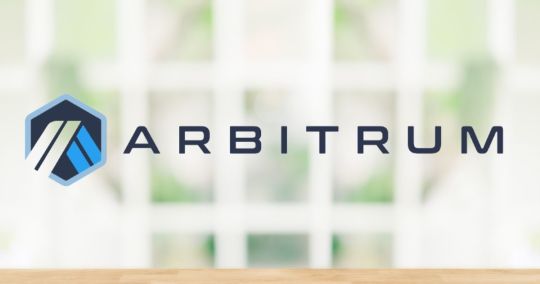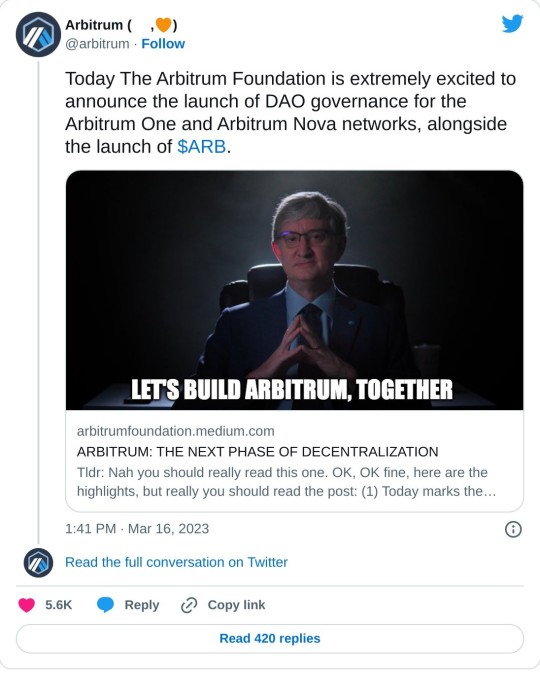#Offchain Labs
Explore tagged Tumblr posts
Text
Arbitrum Announced Airdrop And Self-Executing Governance For Decentralized Future
Arbitrum, the Ethereum scaling solution, has launched a DAO governance for its Arbitrum One and Arbitrum Nova networks. The launch marks a critical milestone for decentralization, as the future of Arbitrum will be controlled by its community, which will govern the blockchain. The DAO governance launch is the next logical step in Arbitrum’s decentralization roadmap, following its 18 months of successful operation on the mainnet.

Key Highlights
Arbitrum’s launch of DAO governance marks a critical milestone in the journey towards decentralization.
The ARB token is essential for distributing power to the community, controlling upgradeability and nominating delegates.
The voting process ensures careful deliberation and time for users to react to changes.
With $3.69 billion locked into its Ethereum rollup network, Arbitrum is the clear market leader in the layer-2 market.
Join the revolution and help govern the future of blockchain technology with self-executing DAO governance on Arbitrum!
How do I claim Arbitrum on airdrop?
Visit Arbitrum website, connect your wallet and check your eligibility to claim $ARB
2. To claim tokens, eligible users should go to the Arbitrum website on 23rd March 2023

The decentralization of Arbitrum is driven by a security-first mindset, which emphasizes that security and decentralization are closely linked. To achieve a secure and decentralized L2, any centralized points of chain control must be removed to enable the chain to operate trustlessly. From the earliest days of the first testnet launch, fraud proofs have been live and are critical to both security and decentralization. Additionally, the Arbitrum Security Council, a 12-member multisig of highly regarded community representatives, has been established to ensure the chains’ security.
Upgradeability is also critical for introducing improved technology and patching software in the event of a discovered vulnerability. The $ARB token is essential for distributing this power to the community, and the Arbitrum DAO controls upgradeability. ARB will be airdropped to community members on March 23, with eligibility based on user activity, including the number of transactions, applications used, and length of usage. The total circulation of ARB will be 10 billion, with 56% controlled by the Arbitrum community, 44% reserved for investors and employees of Offchain Labs, subject to lock-up periods and vesting schedules.
The voting process for on-chain actions requires a minimum of 21–37 days to pass before a proposal can be executed. The DAO’s votes will have the power to effect and execute its on-chain decisions without relying on an intermediary to carry out those decisions. The voting process ensures that proposals are carefully deliberated, voted on, and that users have time to react to upcoming changes. ARB’s introduction has been timed to coincide with the launch of Arbitrum Orbit, which will allow third-party apps and protocols to build new “layer 3” blockchains based atop Arbitrum’s low-fee infrastructure.
According to data pulled from L2 Beat, Arbitrum has $3.69 billion locked into its Ethereum rollup network, making it the clear market leader in a cut-throat field of competing chains. In terms of how much money is on it, Arbitrum commands more than 55% of the layer-2 market, making it the market leader. The launch of its native ARB token makes Arbitrum one of the first L2 to launch self-executing governance. ARB will allow users to nominate delegates to help steer the project’s direction.
In conclusion, Arbitrum’s recent developments demonstrate the power of decentralization in blockchain technology. With the launch of the ARB token, the community will have the power to control Arbitrum’s future and license its technology. Arbitrum is leading the way as the first L2 to launch self-executing governance, and the decentralization brought by ARB will make the Arbitrum ecosystem more decentralized than alternative scaling chains. With its market-leading position, the launch of the ARB token is an exciting development that is worth keeping an eye on.
More Articles
Federal Reserve To Launch FedNow, A Real-Time Payment System To Compete With Stablecoins And CBDCs
Crypto Companies Adapt To Banking Setbacks: Turning To Fidelity Investments And Decentralized Exchanges
Machankura: The Groundbreaking Tool Enabling Access To Bitcoin Services Without Internet Across African Countries
LinksDAO Set To Acquire Spey Bay Golf Course, Paving The Way For World’s Largest Golf Community
2 notes
·
View notes
Text
Curvance Confirmed Airdrop: Step-by-Step Guide
Curvance, a decentralized stablecoin lending protocol, is offering an exciting opportunity to participate in their airdrop event. With a funding raise of $3.6M, this is a project with strong backing from significant investors like Sandeep Nailwal, Wormhole, Offchain Labs, Frax, and others. Key Details: Raised: $3.6M Cost: FREE Potential Gain: Significant returns in $CVE tokens Here’s a…
0 notes
Text
$5M Invested Into Innovative Blockchain
Oak Grove Ventures has publicly disclosed a $5 million investment in DuckChain, an innovative blockchain platform that utilizes TON-based EVM solutions. Several well-known companies, including dao5, Tandem by Offchain Labs, Kenetic Capital, DWF Ventures, Skyland Ventures, and angel investors from leading projects like Camelot and Quantstamp, also contributed to this fundraising round.
https://crypto.news/oak-grove-ventures-invests-5m-in-duckchain-to-advance-blockchain-innovation/
0 notes
Photo

Offchain Labs Explores High-Throughput Scaling for Arbitrum with Alt-Clients
0 notes
Text
Vitalik Buterin Outlines Ethereum’s Future Post-Merge
The Ethereum founder outlines the possible enhancements of the protocol following the Merge.
The improvement areas include transaction speed, solo staker accessibility, and security.
Offchain Labs promises continued support for Ethereum’s fulfillment of its future goals.
Ethereum founder Vitalik Buterin shared insights on the protocol’s potential improvements following the Merge. He outlined areas of enhancement, including transaction speed, solo staker accessibility, and security.
In a blog post released on October 14, Buterin acknowledged the Merge as the “most important event” in the blockchain’s history. The long-awaited Merge transitioned Ethereum’s consensus mechanism from Proof of Work (PoW) to Proof of Stake (PoS). Buterin commended the network's stable operation and resistance to centralization risks.
One of the main issues that Buterin identifies yet to be resolved is the longer transaction time. Buterin envisions Ethereum’s advanced future with reduced transaction finalization time. He proposed solutions like single-slot finality that enhance competitiveness and user experience.
Related: https://cryptotale.org/vitalik-buterin-highlights-ethereums-progress-at-token-2049/
Another important focus is to make Ethereum more accessible to a broader range of users. Buterin aims to reduce the minimum staking requirement from 32 ETH to 1 ETH, making participation more inclusive. This would in turn increase the ecosystem’s decentralization, minimizing the risk of a single entity’s control.
Further, the Ethereum founder emphasized the significance of the blockchain’s security. He hinted at the possible implementation of a cryptographic technique called single secret leader election. He believes that it would make it difficult for the attacker to take control of the system.
Meanwhile, Offchain Labs has expressed enthusiasm for partnering with Ethereum. The firm plans to continue its journey with Ethereum to achieve the latter's future goals. Offchain Labs’ co-founder Steven Goldfeder remains confident in Ethereum’s long-term success. This is mainly due to its decentralized nature. As per Goldfeder, Ethereum will lead the Layer 1 blockchains, while Arbitrum will be at the forefront of L2 networks. Buterin appreciated Offchain Labs' efforts and contributions to Ethereum’s successful journey.
0 notes
Text
Vitalik Buterin Praises Offchain Labs and Arbitrum’s Contributions to Ethereum
Ethereum founder Vitalik Buterin recognized Offchain Labs for their technical expertise and Layer 2 solution, Arbitrum. Buterin’s remarks came after Offchain Labs co-founder Steven Goldfeder expressed confidence in the long-term success of both Ethereum and Arbitrum due to their decentralized solid designs. Buterin’s endorsement highlights Arbitrum’s growing significance within the Ethereum…
0 notes
Text
Decoding Vitalik Buterin’s L2 Blueprint: A Deep Dive into Ethereum’s Prospective Path
Key Points
Steven Goldfeder defended Vitalik Buterin’s L2 roadmap against recent criticisms.
Buterin also joined the discussion, providing his perspective on Layer 2 solutions.
Recently, the vision of Vitalik Buterin for Layer 2 (L2) solutions has been under scrutiny. Critics claim these solutions have deviated from the foundational principles and original roadmap of Ethereum (ETH).
Critics argue that L2 solutions, created to boost Ethereum’s scalability, no longer coincide with the network’s core goals. However, they often fail to consider important elements of Buterin’s 2020 rollup-centric roadmap, which lays out a clear path for L2 development.
Defending Buterin’s L2 Roadmap
Steven Goldfeder, co-founder of Offchain Labs, responded to these criticisms in a recent post. He revisited Buterin’s 2020 roadmap, highlighting that the current development of L2 solutions is still in line with Ethereum’s long-term vision.
Goldfeder refuted the critics, stating they hadn’t read Buterin’s rollup-centric roadmap from 2020. To support his argument, Goldfeder shared quotes that directly counter some of the most unusual claims, providing clear proof in favor of Buterin’s original roadmap.
The first criticism was based on a common misunderstanding that different L2 solutions, such as Arbitrum and Base, couldn’t be part of the Ethereum ecosystem due to their competitive nature. However, Goldfeder debunked this claim by referring to Buterin’s roadmap, which stressed that it’s okay for Ethereum to consist of several unique “islands” that are still part of a larger Ethereum.
Diversity in L2 Solutions
These “islands” can still contribute to the overall Ethereum ecosystem despite their differences. The diversity in L2 solutions strengthens Ethereum by offering various approaches that complement the network rather than detract from it.
The second claim was that “L2 tokens are bad. Collecting fees/MEV revenue is bad and misaligned with Ethereum.” Goldfeder pointed out that this claim is baseless, emphasizing that it was a key feature in the 2020 roadmap.
The final claim made by critics was that “L2s aren’t meant for DeFi. DeFi should be left on Ethereum, and L2s supporting DeFi projects are misaligned.” To this, Goldfeder responded by stating that Vitalik literally calls out DeFi as the expected first adopter in a comment on the 2020 roadmap.
Vitalik Buterin also joined the discussion and shared his views on Layer 2 solutions. Meanwhile, the price of Ethereum struggled to break the $2,500 barrier, trading at $2,337—down 0.91% over the past 24 hours.
0 notes
Text
Fabric Cryptography Raises $33m
Fabric Cryptography secures $33M for revolutionary VPU chip in Series A.
Silicon Valley, Aug 20: Fabric Cryptography, a startup at the forefront of advanced cryptographic technology, has secured $33 million in Series A funding. The funding round was co-led by Blockchain Capital and 1kx, with participation from prominent industry leaders such as Offchain Labs, Polygon, and Matter Labs. This follows a previous $6 million seed round, bringing the total funds raised to…
0 notes
Text
Arbitrum Leads in Layer2 Profit Margins, Optimism Struggles: Report
The competition among layer 2 (L2) scaling solutions in the Ethereum ecosystem is heating up, with Arbitrum emerging as a frontrunner in terms of profit margins, according to a recent report. While Arbitrum leads the pack, Optimism, another prominent L2 solution, is facing challenges in maintaining its competitive edge, raising questions about the future of Ethereum's scalability.
Layer 2 solutions aim to alleviate Ethereum's scalability issues by processing transactions off-chain, thereby reducing congestion on the main Ethereum network and lowering transaction fees. As Ethereum continues to grapple with high gas fees and network congestion, the need for effective L2 scaling solutions has become increasingly pressing.
Arbitrum, launched by Offchain Labs, has gained traction among developers and users for its fast transaction processing times and low fees. The recent report highlights Arbitrum's success in attracting users and generating revenue, leading to healthy profit margins for both developers and validators.
In contrast, Optimism, another L2 scaling solution, has faced challenges in achieving similar levels of adoption and profitability. Despite its early promise and backing from prominent investors like Andreessen Horowitz, Optimism has struggled to overcome technical hurdles and deliver on its ambitious roadmap.
One of the key factors contributing to Arbitrum's success is its early adoption by decentralized finance (DeFi) projects and decentralized exchanges (DEXs), which have migrated to the Arbitrum network to take advantage of its lower fees and faster transaction speeds. This influx of users and liquidity has translated into higher profits for Arbitrum developers and validators.
On the other hand, Optimism has faced criticism for its slow rollout and delays in launching its mainnet. These delays have led to frustration among developers and users, prompting some projects to explore alternative L2 solutions like Arbitrum.
The divergent paths of Arbitrum and Optimism underscore the competitive dynamics at play in the Ethereum ecosystem. While both solutions aim to address Ethereum's scalability challenges, their success hinges on factors such as user adoption, developer support, and technical robustness.
Looking ahead, the competition among L2 scaling solutions is expected to intensify as Ethereum continues its transition to a proof-of-stake (PoS) consensus mechanism and prepares for the highly anticipated Ethereum 2.0 upgrade. As developers and users seek scalable and cost-effective solutions for Ethereum-based applications, L2 solutions like Arbitrum and Optimism will play a crucial role in shaping the future of decentralized finance and the broader Ethereum ecosystem.
In conclusion, Arbitrum's leadership in layer 2 profit margins highlights its growing prominence in the Ethereum ecosystem, while Optimism grapples with challenges in maintaining its competitive position. As Ethereum's scalability becomes increasingly critical, the success of layer 2 scaling solutions will be essential in unlocking the network's full potential and driving broader adoption of decentralized applications.
0 notes
Text
White Hat Hacker Finds Multi-Million Dollar Vulnerability in Ethereum to Arbitrum Bridge
A significant vulnerability has been uncovered by a self-proclaimed white-hat hacker within the Ethereum to Arbitrum Nitro bridge, potentially exposing users' funds to interception. Dubbed 'Riptide' on Twitter, the hacker revealed that the flaw allows malicious actors to intercept funds being transferred from Ethereum to Arbitrum Nitro.
In a Medium post, Riptide outlined the severity of the vulnerability, explaining that it could enable selective targeting of large ETH deposits or wholesale siphoning of all deposits passing through the bridge. This vulnerability, if exploited, could have resulted in substantial losses, with Riptide citing a recorded instance involving 168,000 ETH, valued at over $225 million.
Despite the potential for illicit gains, Riptide opted for ethical disclosure and promptly notified the Arbitrum team. In recognition of their efforts, Riptide was rewarded with 400 ETH, equivalent to more than $536,500. However, Riptide expressed disappointment at not receiving the maximum bounty of $2 million, considering the magnitude of the vulnerability.
Neither Arbitrum nor its parent company, OffChain Labs, have issued a public statement addressing the vulnerability. Media outlets have sought clarification from OffChain Labs, but responses are pending.
The discovery of vulnerabilities within blockchain bridges underscores the ongoing challenges faced by decentralized finance (DeFi) ecosystems. With Arbitrum undergoing upgrades aimed at enhancing interoperability and reducing transaction fees, vulnerabilities like this highlight the importance of robust security measures.
This incident adds to a series of high-profile DeFi exploits, including the theft of $100 million from Horizon Bridge in June and $190 million in August. These incidents underscore the persistent threat posed by malicious actors within the DeFi space and the critical need for comprehensive security protocols to safeguard users' funds.
In conclusion, while the prompt action of white-hat hackers like Riptide helps mitigate potential risks, the frequency of such vulnerabilities underscores the evolving nature of cybersecurity challenges in decentralized ecosystems. Addressing these vulnerabilities requires proactive measures from blockchain developers and ongoing collaboration within the DeFi community to uphold the integrity and security of the ecosystem.
0 notes
Link
DuckChain’s goal of enabling decentralized apps within the Telegram ecosystem is supported by the $5 million investment from Oak Grove Ventures. Oak Grove Ventures has publicly disclosed a $5 million investment in DuckChain, an innovative blockchain platform that utilizes TON-based EVM solutions. Several well-known companies, including dao5, Tandem by Offchain Labs, Kenetic Capital, DWF Ventures, Skyland Ventures, and angel investors from leading projects like Camelot and Quantstamp, also contributed to this fundraising round. With DuckChain’s seamless integration into Telegram’s ecosystem, developers can create decentralized apps that meet the demands of more than 30 million active Telegram users. DuckChain seeks to leverage Telegram’s large user base’s blockchain potential by utilizing a TON-based EVM solution, offering scalable solutions that bridge Web2 and Web3. Oak Grove Ventures’ decision to invest in DuckChain aligns with the company’s commitment to promoting innovative blockchain technology. Due to its unique interaction with Telegram, DuckChain is positioned as a key participant in the adoption of blockchain technology, making it easier for developers and consumers to transition to the Web3 era. According to Oak Grove Ventures, this investment is a strategic step to help DuckChain make significant progress in decentralized applications. Web3, AI, and biotechnology are just a few of the modern industries in which Oak Grove Ventures specializes in early-stage investments. With offices in major international locations including Silicon Valley, Singapore, Hong Kong, and Tokyo, Oak Grove Ventures is an expert at spotting and supporting potential startups and entrepreneurs in their infancy. The company’s commitment to supporting initiatives that push the limits of blockchain technology has taken a major step forward with its investment in DuckChain. According to Oak Grove Ventures, the broader adoption of decentralized apps will be largely dependent on DuckChain’s vision and its smooth integration with Telegram’s platform. 2024-12-30 09:12:27 https://crypto.news/app/uploads/2024/12/crypto-news-DuckChain-option01.webp
0 notes
Text

Kryptos Goes Live On Arbitrum, Simplifies Crypto Taxes For The Layer-2 Solution
Arbitrum One is a leading Ethereum Layer-2 scaling solution developed by Offchain Labs. An Optimistic Rollup, Arbitrum One provides ultra-fast, low-cost transactions with security derived from Ethereum.
0 notes
Text
A Layer 2 Blockchain Solution Raises $5M
DuckChain, a layer-2 solution enhancing the TON blockchain, has secured $5 million in a strategic funding round led by investors such as dao5, Offchain Labs, Kenetic Capital, and DWF Ventures. Additional backers include Oak Grove Ventures, Skyland Ventures, GeekCartel, Gate.io, and Presto.
The funds will be used to improve Ethereum Virtual Machine (EVM) compatibility, boost TON’s scalability, and attract users from other blockchain ecosystems. DuckChain has also partnered with Arbitrum, OKX Wallet, and OnePieceLab to further strengthen its ecosystem.
0 notes
Photo

Timeboost: Offchain Labs' Innovative Transaction Ordering for Arbitrum
0 notes
Text
Arbitrum — L2

1. Что такое #Arbitrum? Arbitrum — L2 решение для Ethereum, разработанное OffchainLabs . Использует механизм Optimistic Rollup для ускорения и снижения стоимости транзакций (в среднем транзакции выполняются за несколько секунд и стоят около $0,06-$0,12).
Официальный твиттер:@arbitrum
2. Финансирование.
Инвесторы: Pantera Capital, Coinbase Ventures, Polychain Capital, Ribbit Capital, Lightspeed Venture, Redpoint, Compound VC и Alameda Research. Привлечено: $123,7 млн.
3. Статистика на сентябрь 2023 года.
Общая заблокированная стоимость (TVL) составляет ~$1,67 млрд;
132К активных пользователя;
Запущено 452 проекта.
4. Токеномика.
$ARB — нативный токен экосистемы, токен управления Arbitrum DAO. Общее предложение 10 млрд монет. В циркуляции 1,275 млрд монет. Уровень инфляции 2% в год. 42,78% — принадлежит Arbitrum DAO;
26,94% — принадлежит Offchain Labs; 17,53% — принадлежит инвесторам Offchain Labs; 11,62% — airdrop; 1,13% — поощрения разработчикам.
5. Партнерства и интеграции.
Arbitrum обладает множеством партнерств, однако недавно проект установил важнейшее сотрудничество с @chainlink и интегрировал протокол CCIP (разработан #Chainlink и Swift для того, чтобы традиционные финансовые учреждениям могли совершать крипто-переводы).
6. Инструменты и разработки.
Решение Arbitrum Nova для игр и социальных приложений; - Инструмент Orbit для запуска L3-блокчейнов (сейчас на нем разрабатывается интересный игровой протокол@XAI_GAMES);
Решение Stylus для созд��ния смарт-контрактов на различных языках программирования (Solidity, Rust, C и C++); - Гранатовая программа на 75 млн ARB для разработчиков.
0 notes
Text
Digifinex Labs: Horizen Labs, Offchain Labs, and the Arbitrum Foundation Propose Apechain Powered by Arbitrum

The proposal outlines the vision for Apechain as a fundamental component of the Ape brand, with APE serving as its native gas token. This strategic move is intended to broaden the reach and utility of APE in the wider cryptocurrency landscape. The proposal emphasizes the permission to use “powered by Apecoin” branding, underscoring the seamless integration of APE’s identity into Apechain.
A key focus of the proposal centers on gaming, aiming to position Apechain as a hub for next-generation consumer-facing applications and games. This aligns with the strategic emphasis on gaming within Yuga Labs’ ecosystem. Apechain seeks to deliver an enhanced user experience by ensuring low fees and fast transactions.
Get your $550
Registering DigiFinex now grants you a newcomer’s package worth $550: Click to register
If you want to receive all the rewards, please contact me: Telegram
0 notes